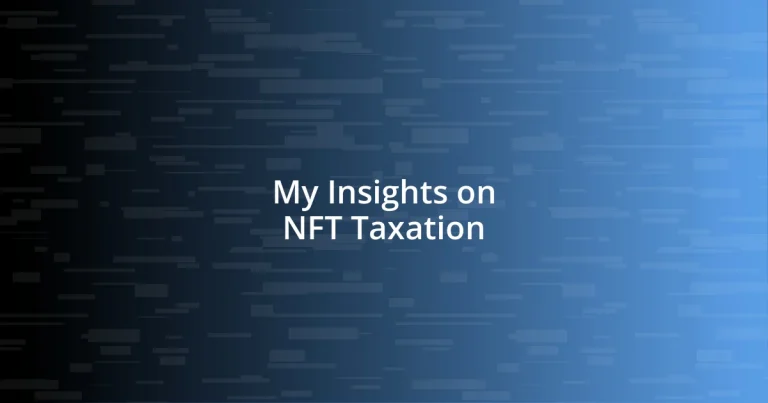Key takeaways:
- NFTs are treated as property by the IRS, triggering capital gains taxes on sales, trades, and potentially gifts, emphasizing the need for meticulous record-keeping.
- Understanding short-term vs. long-term capital gains can significantly impact tax obligations, with long-term holding generally providing lower tax rates.
- International NFT transactions may introduce complex tax liabilities across jurisdictions, necessitating awareness of global tax laws and potential double taxation issues.
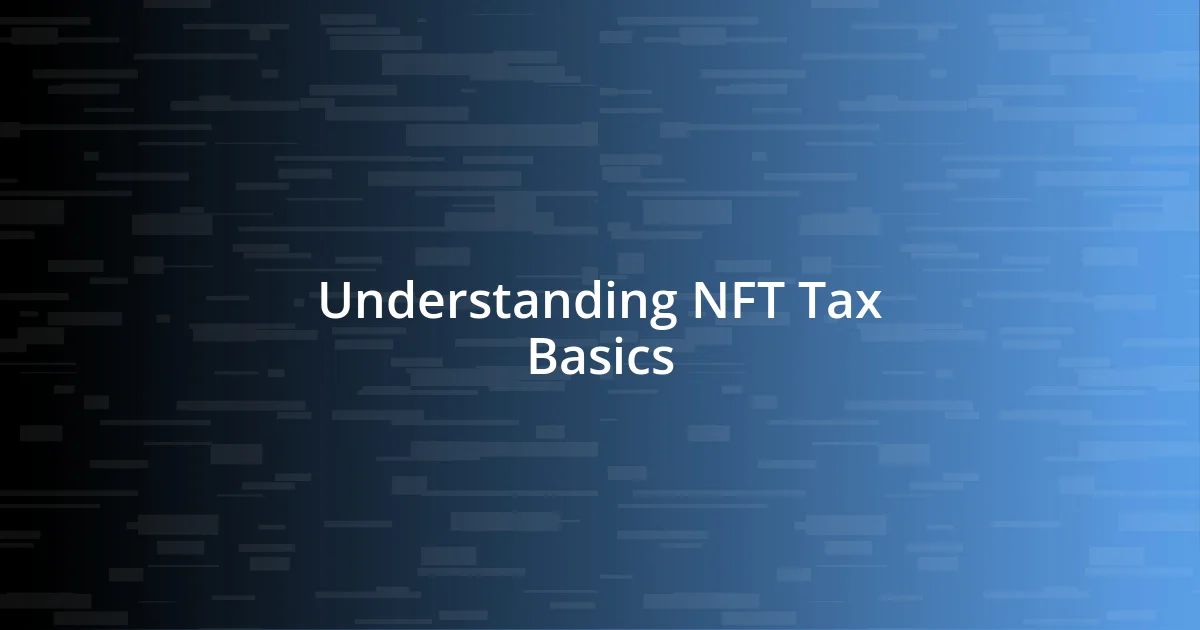
Understanding NFT Tax Basics
When I first stumbled into the world of NFTs, I was excited by their potential, but the looming question of taxes hung over me like a dark cloud. Digital assets like NFTs are treated as property by the IRS, which means that any sale or trade could trigger capital gains taxes. Have you ever tracked the fluctuating value of your digital art? The gains might feel unreal, but for tax purposes, they’re very real.
It’s fascinating to think about how buying that unique digital piece could mean not just the thrill of ownership but also a tax obligation. If you hold your NFT for more than a year before selling, you might benefit from lower long-term capital gains rates. It’s a strategy that has saved me money, making the timing of transactions as critical as the artworks themselves.
The nuances of NFT taxation can be a bit overwhelming, and I remember the relief I felt when I finally grasped that keeping accurate records of purchases and sales is vital. Each purchase, trade, or even gifting of an NFT can have tax implications. Have you kept meticulous records? I can’t stress enough how having that information handy will ease the stress when tax season rolls around.
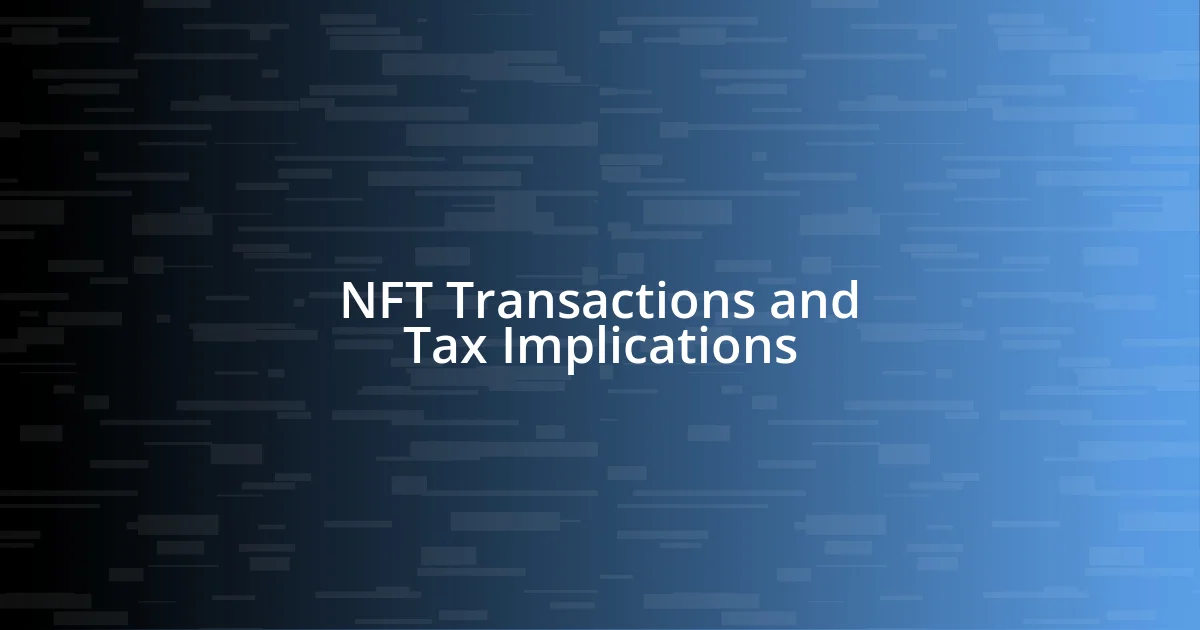
NFT Transactions and Tax Implications
NFT transactions can quickly get complicated when you factor in taxes. For instance, I learned the hard way that each sale or exchange can lead to unanticipated capital gains taxes. It’s like a game of chess; every move matters and can affect the final outcome. Imagine discovering that, after trading an NFT, you owe taxes on the appreciation—it certainly took me by surprise!
As I navigated through my projects, it became evident just how critical it is to understand the timing of transactions. Selling an NFT shortly after purchase means I’m likely facing higher short-term capital gains taxes, which definitely stung a little. I realized that holding onto an asset can sometimes be a savvy financial decision, though it’s not without its emotional trials. The thrill of a sudden sale can be enticing, yet weighing that against potential tax implications adds an extra layer of contemplation.
It’s also worth mentioning the impact of gift transactions. When I decided to gift an NFT, I was taken aback to learn that it could still come with tax implications for the giver and receiver. It’s inspiring to share digital art, yet understanding the potential tax consequences can dampen what should be a joyful occasion. Keeping these aspects front of mind has transformed how I view every digital asset I buy, sell, or share.
| Transaction Type | Tax Implication |
|---|---|
| Sale | Capital gains tax on appreciation |
| Trade | Taxable event; potential capital gain calculation required |
| Gift | Potential gift tax liability; still taxable for recipient |

Tax Treatment of NFT Sales
When I first sold an NFT, I was caught off guard by the capital gains tax implications. I had always viewed the transaction as just a sale, but the moment the buyer transferred funds, I realized I was now responsible for reporting that profit to the IRS. It felt a bit like a gut punch to know that my excitement over a successful sale came paired with a tax bill I hadn’t anticipated.
Every sale can trigger a domino effect in taxation, especially when it comes to realizing gains. Here’s what I’ve come to learn and take to heart:
- Short-term capital gains apply if I’ve held the asset for less than a year, leading to higher tax rates.
- Long-term capital gains kick in after a year, which can significantly reduce the taxes owed.
- Losses can be offset against gains when reporting taxes, offering some relief during tax time.
- Accurate record-keeping is indispensable; it’s my best ally in sorting through the potential chaos during tax season.
Navigating NFT taxation isn’t just about understanding the numbers; it’s about grasping their impact on my financial outlook. I distinctly remember tallying up my net gains and feeling that mixture of triumph and anxiety wash over me. Each transaction isn’t just a financial decision; it’s a reflection of how I engage with my digital collection and the broader marketplace. Keeping track isn’t just a chore—it’s an essential step in protecting my investments.
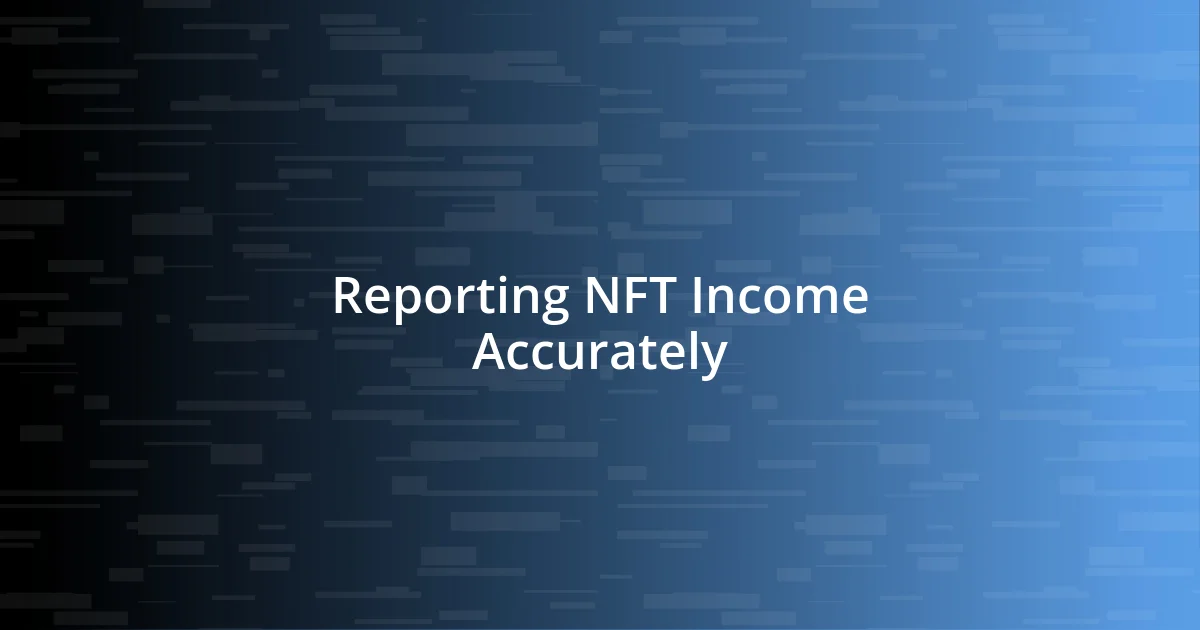
Reporting NFT Income Accurately
Reporting NFT income accurately requires a meticulous approach, and I can’t stress enough how crucial it is to keep detailed records. When I started tracking my transactions, I quickly learned that even the smallest detail—like transaction fees—can impact my overall tax calculations. Have you ever had that moment where you thought you were in the clear, only to dive deeper and find a new layer of complexity? It’s an eye-opener!
One time, I almost missed reporting a secondary sale because I didn’t realize it qualified as income. I’d sold an NFT, thinking it was just a piece of art I loved, but when I dug into my figures later, I discovered the IRS would consider any profit a taxable event. The weight of that realization was intense; it was a blend of excitement mixed with anxiety about filling out my tax return correctly. This experience made me appreciate how vital it is to stay informed about every transaction—not just the high-profile ones.
Looking back, I wish I had sought out a financial advisor who specializes in NFTs earlier on. Navigating taxes in this ever-evolving landscape can feel like trying to read a map in a foreign language. I’ve learned that having guidance can help demystify the process, especially when it comes to ensuring all income streams are reported accurately. What’s been your biggest challenge in reporting NFT income? I can tell you, understanding my obligations gave me peace of mind and put me in better control of my financial destiny.
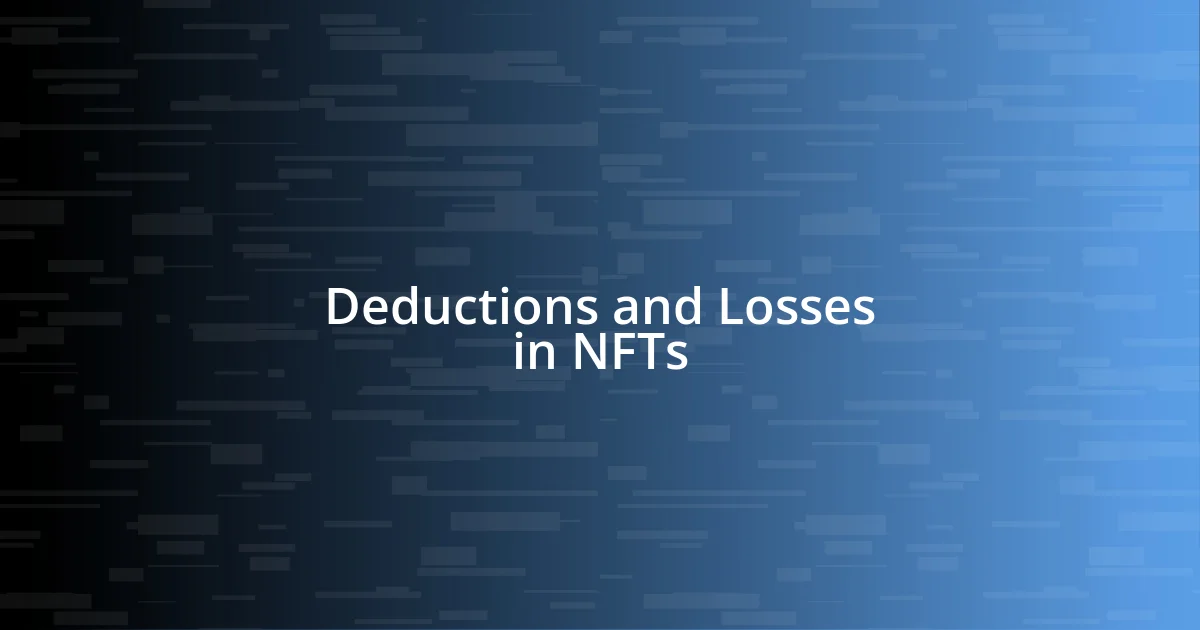
Deductions and Losses in NFTs
Deductions and losses in the realm of NFTs can, surprisingly, play a vital role in mitigating your tax burden. I discovered this firsthand when I sold an NFT at a loss after initially investing much more. When preparing my tax filings, I realized that I could deduct that loss against other capital gains, softening the blow of an otherwise disappointing transaction. It struck me how essential it is to see losses not just as failures but as strategic tools in tax planning.
Have you ever thought about the emotional weight that losses can carry? For me, there was a sense of relief in knowing that some of those losses had purpose. I remember feeling frustrated when a prized NFT I held for months depreciated sharply in value. Yet, understanding that I could account for that loss reminded me that the NFT market, much like life, can be unpredictable. Recognizing and documenting these losses gives us control, allowing us to transform a setback into a financial advantage.
Another aspect worth considering is the importance of proper documentation when dealing with deductions. It’s not just about what I can report; it’s about how well I organize my records. After one chaotic tax season where I scrambled for receipts and transaction details, I committed to a streamlined tracking system. This ensured that when I faced unexpected losses, I had all the necessary evidence at my fingertips to secure those deductions without stress. What about you? Have you faced a similar situation with organization? I learned that being proactive not only clarifies my tax situation but also provides peace of mind.

International NFT Tax Considerations
When it comes to international NFT taxation, the rules can get quite convoluted. I remember a time when I mistakenly assumed that my tax obligations were strictly tied to my home country. However, as I ventured into buying NFTs from overseas creators, I quickly learned about the complexities of jurisdiction. Questions started to pop up in my mind: Where does the income count? Which tax laws apply? It’s fascinating and a little nerve-wracking to realize that the global nature of NFTs can complicate our financial responsibilities.
One experience I had involved an NFT I purchased from a creator based in another country. To my surprise, I discovered that I needed to consider the tax implications in both my country and the seller’s. I felt a wave of anxiety as I navigated through the murky waters of international taxation. Do you have an ongoing project or investment that crosses borders? I found that reaching out to tax professionals familiar with international regulations provided clarity, ultimately turning my worries into informed decisions.
The essential takeaway here is to stay educated about how different countries treat NFT transactions. In my journey, I learned about value-added tax (VAT) implications in certain regions and how they could unexpectedly affect my overall investment strategy. It’s crucial to read up on international treaties as they may help avoid double taxation. Have you ever faced a similar situation where you were unsure of the tax implications? This ongoing learning process not only helps me manage my tax liabilities better but also empowers me to make confident choices moving forward.
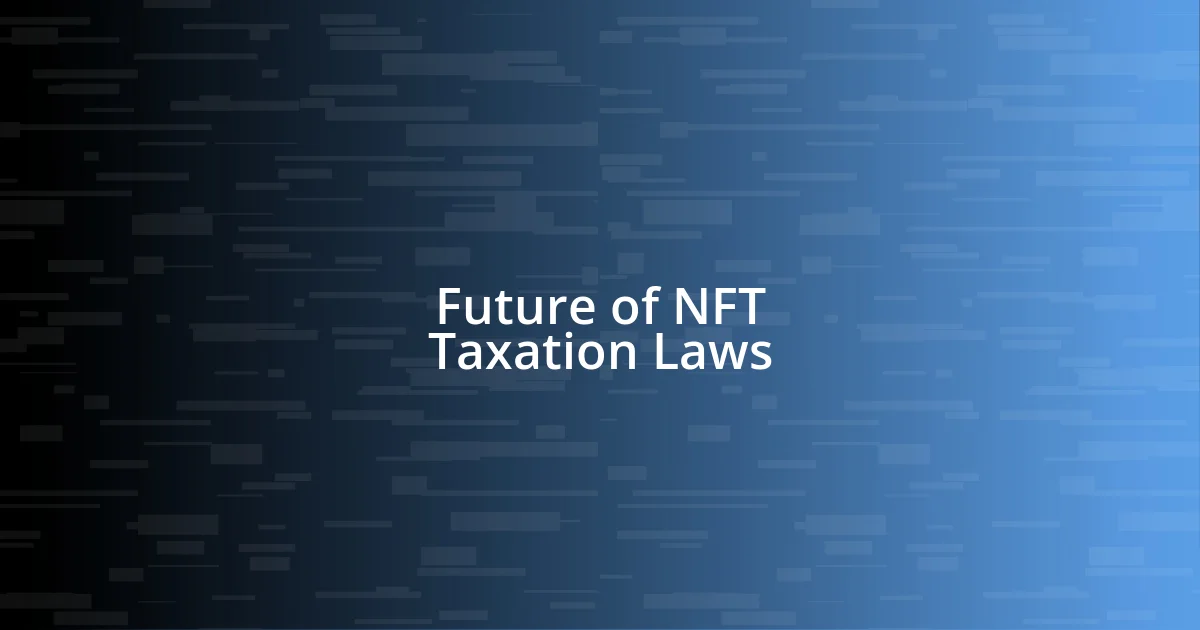
Future of NFT Taxation Laws
The future of NFT taxation laws is likely to evolve significantly as governments catch up with the rapidly changing digital landscape. I often wonder how regulators will address the unique characteristics of NFTs, particularly regarding ownership and transfer of value. For instance, as more creators and collectors enter the space, will we see a more standardized approach to taxation, or will the variances continue to create confusion?
Reflecting on my own experiences, I can’t help but think about the potential for tax incentives aimed at encouraging innovation in the NFT market. Imagine a scenario where artists are given tax breaks for selling their digital art, as we start to see shifts toward supportive legislation. How might that impact the NFT ecosystem? Exploring these possibilities excites me, as they could foster a more dynamic environment for both creators and collectors.
As we look ahead, I believe transparency will play a crucial role in shaping NFT taxation. The thought of more comprehensive reporting requirements makes me reflect on my own tax practices. I see the importance of keeping meticulous records; a future where tracking transactions becomes easier with technology could pave the way for a more accountable community. Wouldn’t it be liberating if future regulations allowed both buyers and sellers to navigate these waters with clarity? Embracing these changes seems essential for our collective growth in the NFT space.












